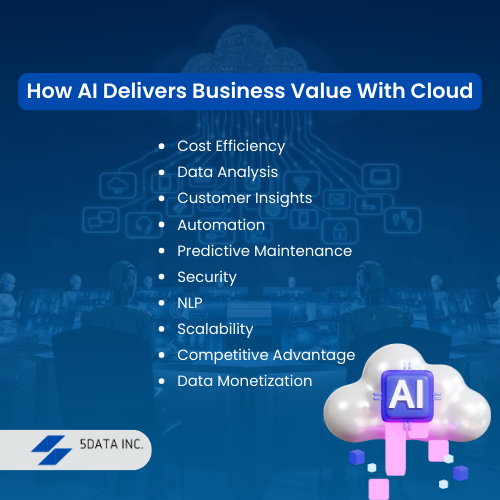Artificial Intelligence
AI integrates the human brain and computer intelligence, enabling machines to make rational decisions. It’s widely used in robotics, virtual gaming, biology, e-commerce, and computer science. Prescriptive analytics rely heavily on AI, but security is crucial to prevent privacy and safety threats. AI streamlines tasks, provides accurate assessments, and offers unique perspectives by replicating human thought processes and collecting data from multiple sources. The goal is to enhance accuracy and efficiency securely while generating value. A cutting-edge technology called generative AI can autonomously produce content without human intervention. This cutting-edge system can create text, images, and music, utilizing advanced deep learning techniques like recurrent neural networks and generative adversarial networks. While generative AI has numerous practical applications, including natural language generation, image creation, and creative tasks such as music and art, it raises ethical concerns about its potential misuse to generate fake content or disseminate misinformation.AI And Cloud Computing
As industries embrace cloud computing, they are also interested in integrating AI to enhance performance. However, seamless integration poses significant challenges. Cloud technology provides flexibility and cost-effectiveness, but adding AI-powered analytical data insights is necessary to enhance data management capabilities. Fortunately, the cloud has robust security measures that block malicious web traffic, and AI systems enhance this protection by detecting and anticipating fraudulent activity based on analytics. Integrating AI and cloud technology can streamline data efficiently and offer enormous potential benefits. Still, it is essential to address the challenges appropriately to take advantage of this cutting-edge technology securely.Maximizing the Business Value of Artificial Intelligence
Deriving business value from AI in the cloud involves several key steps:1. Identify Business Objectives:
Start by understanding your organization’s specific business goals and challenges. Determine where AI and machine learning can drive value for the entire organization, such as improving customer service, optimizing operations, or increasing revenue.2. Data Assessment:
Assess the quality and availability of your data. AI relies on data, so having clean, relevant, and accessible data. Consider data governance and security as well.3. Select the Right AI Use Cases:
Choose AI use cases that align with your objectives and data availability. Common AI applications include predictive analytics, natural language processing (NLP), image recognition, machine learning algorithms, and recommendation systems. Custom mobile app development services can provide firms with ML models and actionable insights.4. Choose Cloud Services:
Select a cloud provider (e.g., AWS, Azure, Google Cloud) that offers AI capabilities and services. Evaluate their AI offerings, scalability, and pricing to match your needs. Hybrid cloud development companies are virtual assistants to most companies and provide cognitive insights for AI projects5. Build or Buy AI Models:
Decide whether to build custom AI models or leverage pre-built generative AI services. Building custom models can offer more tailored solutions but may require more time and resources.6. Data Preparation:
Prepare and preprocess your data for AI model training that often involves data cleaning, feature engineering, and data augmentation.7. Model Training:
Train your AI models using AI technologies and cloud-based tools and resources. Cloud platforms provide scalable computing power for training large models.8. Deployment and Integration:
Deploy your AI models into production environments. Incorporate them into your current systems and workflows to ensure smooth and seamless operation.9. Monitoring and Maintenance:
Monitor AI models for performance and accuracy. Implement maintenance procedures to retrain models as needed and keep them current.10. Measure ROI (Return On Investment):
Set up essential performance metrics (KPIs) to gauge the influence of AI investments on your business. Track metrics like cost savings, revenue increase significant cost savings, revenue growth, and operational efficiency.11. Iterate and Optimize:
Use the insights gained from monitoring and KPIs to iterate and improve your AI solutions. Cloud platforms often provide tools for deep learning and optimization.12. Compliance and Security:
Ensure your AI implementations comply with data privacy regulations and security standards. Cloud providers often offer security and compliance features.13. User Training and Adoption:
Train your team to use AI tools and solutions effectively. Ensure employees understand the benefits and how to leverage AI for their roles.14. Scale and Expand:
Once you see positive results from AI investments, consider scaling AI initiatives to other business areas or exploring new use cases to enhance most business value further.15. Cost Management:
Monitor AI-related costs and optimize resource allocation to maximize ROI. Cloud platforms provide cost management tools to help with this.16. Feedback Loop:
Establish a feedback loop with users and stakeholders to gather input and continuously improve AI solutions. Remember that the value derived from AI in deriving the business value of AI in the cloud may not be immediate. Still, with careful planning, execution, and ongoing optimization, it can significantly benefit your business over time.
Various Ways AI Delivers Business Value With Cloud Technology
1. Cost Efficiency:
Cloud platforms provide scalable resources, allowing businesses to pay only for what they use. AI can optimize resource allocation, reducing operational costs.2. Data Analysis:
AI algorithms can analyze large datasets stored in the cloud to see hidden patterns and extract valuable insights, aiding in data-driven business strategy and decision-making.3. Customer Insights:
AI-powered analytics can uncover customer behavior patterns, customer experience preferences, and trends from cloud-stored data, with key insights and enabling personalized marketing and product recommendations.4. Automation:
AI-driven automation in the various cloud applications can streamline repetitive tasks, increasing efficiency and reducing human error.5. Predictive Maintenance:
AI algorithms can analyze sensors and other data from cloud-connected devices to predict equipment failures, reducing downtime and maintenance costs.6. Security:
AI can enhance cloud security by detecting real-time anomalies and threats, helping protect sensitive data.7. NLP:
Implementing NLP in the cloud through generative AI and ML models can automate customer support through chatbots and sentiment analysis, improving customer satisfaction.8. Scalability:
Cloud-based AI solutions can easily scale to meet growing business demands without significant infrastructure investments.9. Competitive Advantage:
Leveraging AI in the cloud can give businesses an edge by offering customers innovative services, products, or experiences.10. Data Monetization:
Companies can generate additional revenue streams by analyzing market data and selling anonymously on cloud platforms. For deriving the business value of AI in the cloud, aligning AI strategies with specific business objectives and continuously monitoring and adapting AI and cloud implementations as needed is crucial. An experienced software application development company can enable organizations to attain relevant information on business problems and drive innovation.Conclusion
Although AI has made significant progress, it cannot entirely substitute humans. Without human intervention, data loses its significance. AI can assist in enhancing efficiency and offering predictive analysis, but humans must extract insights from the data and make informed judgments. Ultimately, AI serves as a tool that empowers individuals to make data-driven decisions and gain a competitive advantage, accounting for deriving the business value of AI in the cloud.
About the Author...
Aparna Sushumna, a mother to a hyperactive toddler who is all over the house. I aspire to be a decent content developer. A Bachelorette of technology says my qualification but I anticipated being a singer. Thanks to the recession, I dwelled into various jobs, from coding to being a tech support executive to a help desk professional, only to conclude that there is something else I wish to do. Here I am to accomplish my profound passion for content writing. Music, nature, jewelry, beauty, mythology, life quotes, celebs, and their life, being my areas of interest.
